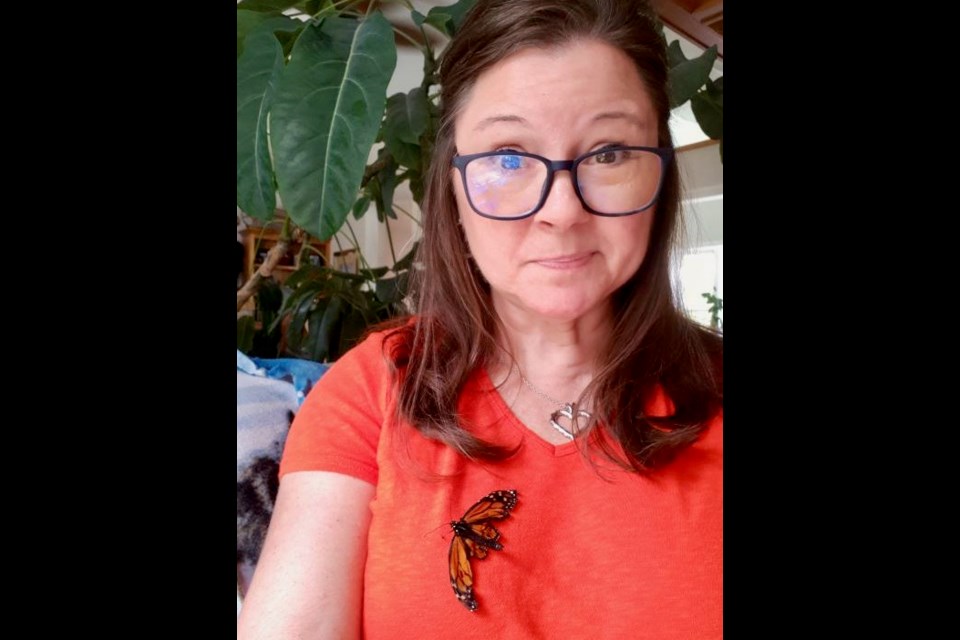A Severn Township woman’s 83-day experience with a helpless but determined butterfly has created a lifetime of memories and important lessons.
On Sept. 4, Krista Storey went to her butterfly garden in the backyard of her home. She found a monarch butterfly whose wings hadn’t properly developed.
She took the imperial insect to the garden in her front yard and watched as it tried to fly.
“He was more of a glider than a flier,” Storey said.
She had a decision to make: Leave the butterfly outside, where it would likely succumb to the cold or a predator, or take it inside and care for it. She chose the latter.
She brought the monarch into her house, along with some pollinator plants, and created a small shelter.
After a couple of weeks, Storey learned the parasite ophryocystis elektroscirrha (OE) was responsible for the butterfly’s condition. OE, as described by The Monarch Joint Venture, is “a debilitating protozoan parasite that infects monarchs.”
“Infected adult monarchs harbour thousands or millions of microscopic OE spores on the outside of their bodies. When dormant spores are scattered onto eggs or milkweed leaves by infected adults, monarch larvae consume the spores, and these parasites then replicate inside the larvae and pupae.”
“As the days went on,” Storey explained, “this OE parasite really started to take its course.”
She wasn’t ready to give up on the monarch. She contacted the butterfly conservatory at Science North for advice. She was given options for food and was told the butterfly could live up to eight months because it had hatched late in the season.
Storey was in it for the long haul, so she created a larger enclosure.
When it came time to eat, Braveheart, as she named her new pet, would try to climb down the side of the enclosure. It was a lot of work for the little insect, so Storey offered a hand. Braveheart gladly crawled on and was given a lift to his lunch of watermelon and grapes.
“He always tried to flap his wings. He really wanted to fly. He wanted to live,” Storey said. “That’s why I gave him the name Braveheart.”
She wanted to see Braveheart fly again, or at least have some proper wings, and another butterfly’s misfortune made that possible.
Storey found a monarch in her yard that had succumbed to the cold. Its wings were intact. So, she began researching wing transplants for butterflies and found it could be, and had been, done.
“He was starting to fade, so I thought, ‘I’m going to go ahead and give him this wing transplant,’” she said. “I wanted to make Braveheart look good and brave during his final days.”
Butterflies do not have pain receptors in their nervous systems, which made Storey feel better as she completed the procedure using fabric glue.
Equipped with his beautiful new flappers, Braveheart tried to fly, but the weight of the wings was too much for his body that had been ravaged by the parasite.
On Nov. 24, Braveheart died.
“It was quite the journey,” said Storey, whose actions no doubt extended Braveheart’s life. “He was treated like a king.”
She detailed that journey on Facebook, and the story created quite a following.
“It made me feel good that it was not only helping me, but it was making other people feel good, too, especially during such a difficult year,” she said. “When he died, there were a lot of people who were heartbroken, just like I was.”
It was also an educational opportunity, and many people who had followed the story of Storey and Braveheart suggested it would make for a great children’s book. Storey agreed.
She was contacted by Liz Stenson, an Orillia woman who has experience writing children’s books. Storey is going to send a chronological account of the experience to Stenson, along with photos she took, in the hope a book will be published.
While there are many children’s books that feature talking insects and other animals, “this is a real story about a real butterfly, and there are so many lessons to be learned,” Storey said.
She hopes it will teach people about parasites like OE, how to clean milkweed to prevent it and how to create pollinator gardens using native plants.
“The other part of this is the story of a being that was born different than others. To me, that is a beautiful and important part of the story,” she said. “It’s also about kindness, caring, people keeping their eyes open to nature and just being kind to other beings, including each other.”
Storey has created a Facebook group so people can continue to learn about Braveheart and be updated on the progress of the book.
